Bangladesh’s ruling Awami League (AL), under Prime Minister Sheikh Hasina, has cemented a fourth consecutive term in power – but not because of widespread popular support. Instead, the election on January 7 was heavily stage-managed, with true opposition parties targeted with arrests while “dummy” candidates were brought in to give the veneer of competition. As a result, the AL once again will govern with an untouchable supermajority.
In the eyes of many analysts, Bangladesh’s transition to one-party rule is now complete.
The Diplomat’s Shannon Tiezzi interviewed Ali Riaz, a distinguished professor of political science at Illinois State University and author of the book “Pathways for Autocratization: The Tumultuous Journey of Bangladeshi Politics,” about Hasina’s grip on power, the international reaction, and the future of Bangladesh’s much-diminished democracy.
So far, the “public reactions to this state-managed saga have been remarkably muted,” said Riaz, who is also a nonresident senior fellow of Atlantic Council and the president of the American Institute of Bangladesh Studies. That may be because the Bangladeshi public long ago became resigned to such a result.
But despite the dark times, Riaz emphasized that the future of Bangladesh’s politics is still being written: “If the opposition can realize that the country is now entering the era of one-party rule, it is incumbent on them to come together to face it. The current trajectory is not destiny.”
Bangladesh’s general election took place on January 7. As expected, the ruling Awami League won re-election in a landslide – largely due to a crackdown on the opposition that sparked an electoral boycott. Voter turnout was low; officially 40 percent but rumored to be in the 20s. How is the Bangladeshi public reacting to the polls?
Public reactions to this state-managed saga have been remarkably muted. Although in private interactions citizens are expressing discontent and frustrations, there has not been any public outrage yet.
Three factors can be attributed to the absence of any robust reactions. First, this was not unanticipated. Since October 28, the chain of events had given a clear impression to the public that the election will be as such. Subsequent machinations laid bare the hollowness of the process. In some respects, this is typical where autocracy rises – the debilitation of rights is so incremental that the citizens accept them in a resigning mood.
Second, is the fear of being persecuted. The culture of fear has permeated society; the nature of persecution that we witnessed – arresting children for their fathers’ involvement with the opposition party, families being threatened, custodial death – has sent a clear message.
Third is the absence of unity among opposition parties. While 16 political parties boycotted the election, they failed to come to a single platform. In a similar vein, public perception is that there is not a single charismatic leader who can rally everyone together.

































